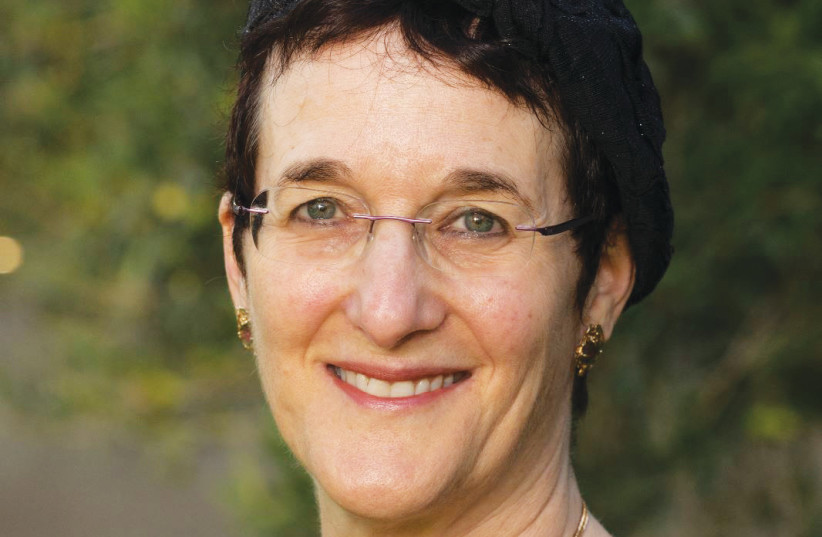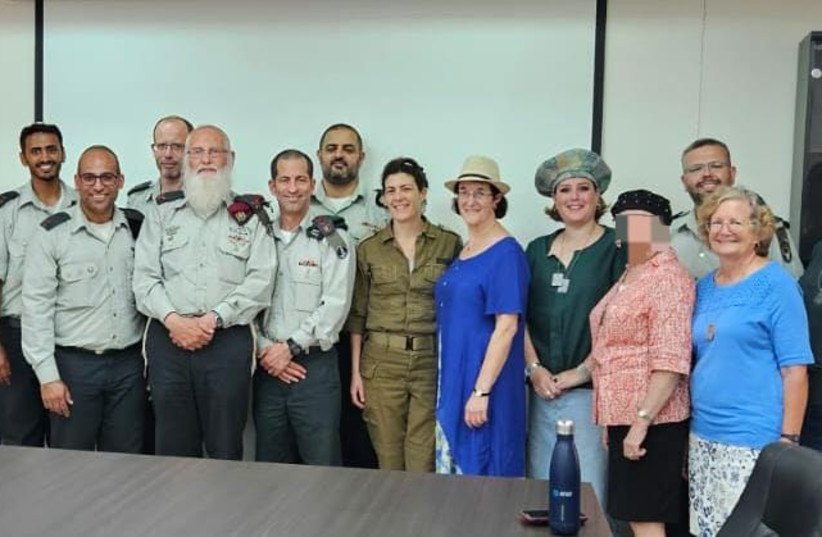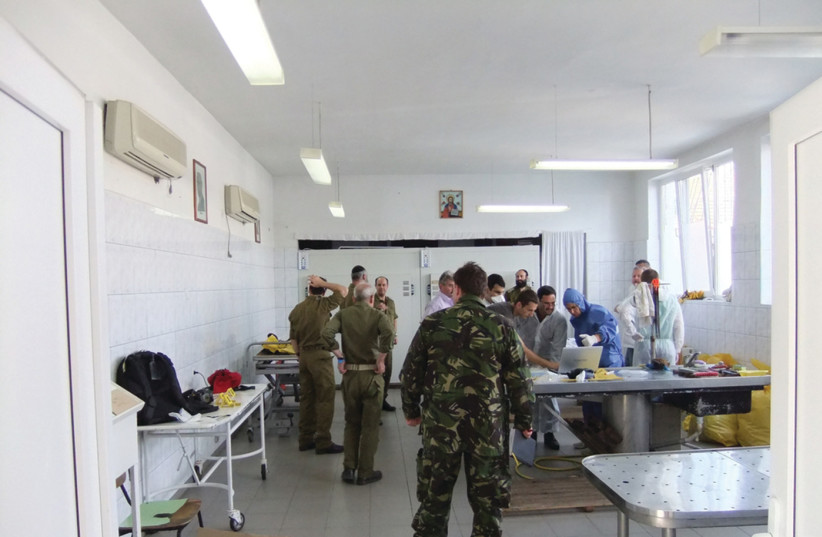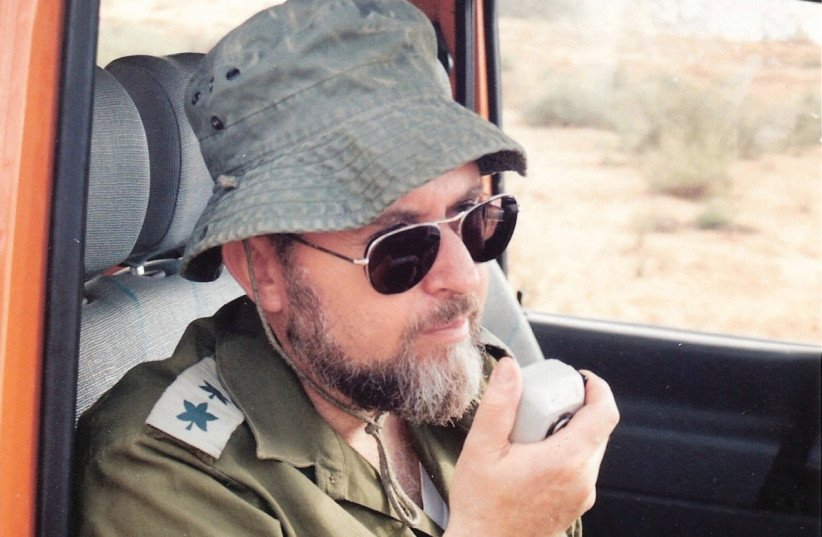The small Jewish world sometimes leads one to fascinating stories. Our son-in-law, Col. Avner Cohen, is the director general of the Chief Rabbinate of the IDF. One day, he mentioned that they have women in a specialized hevra kadisha unit. Hevra kadisha (“holy society”) is the generic name for the organization that exists in every city where there are Jews, commonly known as “burial society.” Its work involves preparing the body for a Jewish burial and carrying out the burial at the site of the cemetery according to Jewish law. Due to the fact that the person who has passed away can never personally repay the hevra kadisha for their diligence and kindness, it is a mitzvah that is called hesed shel emet – a true kindness, not one with any ulterior motive.
Soldiers in the IDF, male or female, who lose their life while enlisted are taken care of by the army’s hevra kadisha and have the right to be buried in an army cemetery.
It is sometimes more painfully complicated. Each soldier wears a dog tag with his or her name and identity number, but there are situations in which it might be difficult to identify the person due to the state of the body if the soldier has have fallen in battle or in a terror attack, in which case forensic specialists are called in.
Women and the performance of ‘tahara’
If a female soldier dies while enlisted, she is taken care of by the army just as the men are. But until 12 years ago, as female soldiers’ deaths were few and far between, volunteer women from around the country who worked for the hevra kadishas in their hometowns were called upon to assist the army professionals in the preparation for burial.

In the last 10 years, more women are entering combat units in the army, thus raising the risk of more female deaths. As a result of this new reality, the IDF Rabbinate realized that it would be important to have women assist in the identification process and burial preparation for female fallen soldiers, known as halala (a male fallen soldier is a halal). Therefore, the IDF decided to create a designated unit for this purpose and have female volunteers undergo specialized training.
In July 2023, the IDF Rabbinate decided to draft and categorize these volunteers as “soldiers serving on miluim [reserve duty].” Now when they come to volunteer, they are considered official members of the IDF. They are issued dog tags and uniforms (although they are not required to wear them). Thus far, there are 15 women in the group from Jerusalem and the center of the country, and 17 from the North.
From Teaneck to the IDF women’s burial committee
In 2010, Sharon Laufer, originally of Teaneck, New Jersey, then living in Jerusalem, recruited the first group of eight women volunteers. Later that year, Laufer and her family moved to Efrat, and she began serving in the hevra kadisha there.
Laufer says that her interest in being a part of this program goes back to her childhood.
“As a child, I was very fearful and anxious about death, to the point that I felt it sometimes incapacitated me. Then, when I was 16 years old, I went to summer camp, and the theme of one of the weeks was Life Cycle Events. For one nighttime activity, they brought people from a hevra kadisha to speak to the teenagers; they brought tahrihim (shrouds) to show us. I’m 64, and I remember this like yesterday. And I thought, ‘This is amazing. I need more information.’ It wasn’t until 13 years later that I got ‘more information.’
“When I was 29 and living in Teaneck with my husband, Nathan, there was a notice on the shul bulletin board requesting volunteers for the women’s hevra kadisha. I answered the message and I said, ‘If there is a tahara [cleansing of the body before burial] needed, call me; I’d like to see if I can do this.’ I got a call one morning in March of 1989 and was asked if I wanted to come and help. When I arrived, the leader of the group said, ‘You are welcome to help and observe and if at any point you’re uncomfortable, you can leave; we’ll answer your questions later.’
“That day was a turning point in my life not only because it was the beginning of my service but because I found that it opened my heart in a way like nothing else that I would choose to do. So I served on the hevra kadisha until making aliyah in 2003.”
Overcoming fear of death
This work helped Laufer overcome her fear of death. “You walk into the tahara room and you don’t know very much about the person on the table; however, the body and the soul speak volumes if you’re open to listening.
“If someone has died tragically – by suicide, murder, or an accident – sometimes you feel the presence of the neshama (soul); and if I’m fortunate enough, during any tahara that I can help that neshama go on, then I feel I’m doing something for this person. So I ask for help from Hashem before I go into any tahara, so that I will be given the consciousness to connect with the neshama and be compassionate and give help where help is needed,” says Laufer.
“I was able to understand that there is more beyond just the body and that the neshama needs help even after it dies – and it’s okay. Death is okay.”

Laufer describes the process of a tahara as a woman is prepared for burial: “It is very similar to the process that religious women go through every month in their childbearing years as they prepare to go to the mikveh. However, in this situation, it is the last preparation. And if she lived a long life, she probably hasn’t gone to the mikveh for a long time. We do this preparation for her for the last time.”
Coming to Israel and the IDF
“In 2003, during my first year in Israel, I wondered, ‘How could I continue my service with the hevra kadisha?’ But there had been no way for it to happen in Jerusalem because it is not open to volunteers,” she says.
In 2006, Laufer’s brother-in-law, Shimon Perchik, a colonel in the IDF reserves, was the designated project leader to develop a computer system and associated protocols that would improve the ability and accuracy to identify soldiers who had died or been killed while in active service (see box).
“Shimon knew about my service in America, and he knew about my frustration about not being able to serve here in the same capacity; so in April of 2010, he approached me and said that as there are now more women in combat units, there are going to be more female causalities, and it is not appropriate for the male soldiers to be handling women’s bodies. He asked me if I would be interested in recruiting a group of women in two separate capacities.
“The first group needed to be computer savvy, and the second group needed to be composed of women who would not be afraid to work with a woman’s dead body. Together, these women would help with the computer system and the manipulation of the halalot during the examination and identification process of any halala. They would also be trained to handle situations of mass casualties.
“I went to all my friends, especially my computer-savvy and physician friends. I also approached women who I thought would be okay with handling a dead body, offering them the opportunity to volunteer for this special unit,” she recounts.

On April 8, 2010, she brought together eight women for their first briefing at her apartment in Jerusalem. “Shimon explained what they were looking for and how we would be connected to a special unit that gathers information on the deceased.
“In June 2010, five of the original eight went with me to the designated army base, and we had our first training session. The following year the group had grown, and we had our first official full training using the computer system and working with an actual model.”
There they were shown the process of what goes into the identification of a soldier and taught how to take fingerprints.
“The process of identification is very detailed so that there will be no unanswered questions as to the cause of death and the proof of identity of the fallen soldier. All the protocols are carefully followed. We are able to match dental records, fingerprints, and DNA to the main data system to confirm identity. In some cases, personal effects found with the body can help with the identification.
“Everything we do is helping the army to be more efficient and precise and to make sure there are no mistakes and that everything is done bekavod, respectfully,” she says.
The first call-up and recruitment
“On July 18, 2011, we got our first call-up. After my first experience, I sent an email to the women who had been with me, including the following comments: ‘I believe that the experience was significant for the three of us; but more importantly, it was obvious that our unit performs a very important role for the [IDF] Rabbanut regarding kavod hamet [respect for the dead]...There is no appropriate way for male soldiers to be part of this process for a female soldier. The exam is very detailed and very intimate... I think that we are fortunate that the Rabbanut has acknowledged this fact and is doing something significant about it,’” she recounts.
Laufer says, “Any hevra kadisha I’ve been a part of knows that after we’ve been through a tahara, it is important to have a debrief of the women involved, so each of us can talk about how we felt and if there is anything we need to process.”
After their call-up, Shimon told them that after the identification of the body, their group would continue with the tahara and that they would not need to call in the women from Bnei Brak who had previously volunteered to perform the latter task.
“We were now a group of nine women, mostly from Jerusalem and Ra’anana, the latter were part of the hevra kadisha there, so we would have enough ‘woman power’ to handle any identification and tahara situation,” she explains.
After moving to Efrat and joining the hevra kadisha there, Laufer was able to recruit additional women.
“Since 2012 our group of women is regularly called upon for taharot in the IDF, even when no identification examination is necessary.”
The IDF also recognized the need for a group like this in the North, so recruiting began there in 2019.
“The IDF has come to understand that they can rely on this group of exceptional women that is committed, able, and available to help in any way needed. They know they can call any hour of the day, and whoever is available says, ‘I will come.’”
They work out of a base in the center of the country and the DNA lab is on the base, which, Laufer explains, enables a rapid confirmation of identity. “Generally, when the call comes very early in the morning, the women from Ra’anana get there first.
“Our commitment over the last 12 years has given the IDF the opportunity to recognize us officially and have given us the status of miluim – reserve soldiers. To be clear, it is possible for us to continue to serve in a voluntary capacity if some of us do not want to actually be drafted. But bureaucratically, it is easier for the army to be able to designate us as part of the miluim unit of the Rabbinate.
“At least once a year we do a full-fledged targil (practice exercise) with all the reserve soldiers from the Rabbinate working with us.”
Handling the emotional side of the job
“It’s my path in life. It’s what I was put here to do. This has followed me my whole life, since my fear of death as a child. I’ve been given the ability to do it, and it’s a gift from God.
“My husband has been supportive of my service all these years, but he’s always wondered if this will affect me emotionally and be a problem, so we talk about how I am feeling after a tahara or what it would be like for me if there is a situation with many casualties and I have to work for 8-9 hours. Baruch Hashem we have not been in that situation, but I imagine it would be exhausting.
“When one is part of the regular hevra kadisha, one typically cares for elderly individuals who’ve lived full lives. In the army, the majority are younger, which is saddening,” says Laufer.
Being in the IDF at 64
“I was always ‘jealous’ of my kids who served in the IDF. And indeed, receiving a dog tag and uniform at 64 is really hilarious. My family understood my desire to serve and how seriously I take my service. I recently participated in the preparation of a halala for the army on a Friday, and I said to my family when I came back that it made my Shabbos. They said, ‘Ima, really you are so weird. Only you would say that handling a dead body made your Shabbos.’”
The spiritual aspect and the privilege
“I feel that it’s important to ask Hashem for help so that we can do everything bekavod, respectfully. We all ask mehila [forgiveness] from the neshama of the deceased after we’re done. I always make a point of holding the hand of the deceased person and opening my heart to give love and support so they will know they are loved.
“There have been times when you can feel the energy in the room is very tense, maybe because it was a traumatic death. I have had experiences where by the end when we’ve cleaned and prepared and washed and dressed and given closure, that you can feel that tension released from the room, and that is my explanation of the neshama, the soul, moving on.”
“In one case, involving a suicide, the woman’s fear and anger were palpable. We helped her move on, a shared unspoken understanding among all of us in the tahara room.
“Every situation is different. I work very hard to make sure that before I go in to do a tahara, for the army or through the Efrat hevra kadisha, I ask for help and strength to do what needs to be done. I see myself as a tool, as a vehicle for doing God’s work. We become the vehicle for preparing the neshama to leave the body because we’ve taken the moment to respect the body and to give thanks for the service that the body has given this neshama.
“Death is not something to be hush-hush about. It’s part of the life cycle. If you can be a part of helping the neshama to complete its cycle, it is a real privilege to do so,” she asserts.
Getting to know Col. (res.) Shimon Perchik
In September 1971, Shimon Perchik joined the IDF Rabbinate’s casualty treatment system after completing his regular military service in the 9th Company of the General Staff of the military rabbinate, numbering 160 soldiers.
“Two years later, during the Yom Kippur War,” he says, “I found myself leading a platoon on the Egyptian front with the mission of evacuating, identifying, and providing dignified burials for our fallen comrades. This experience profoundly exposed the need for improving the IDF’s treatment of its fallen heroes, and for me it became a personal mission.”

In the post-Yom Kippur War years, he continued his service in the reserves, teaching hevra kadisha courses and contributing to the development of a military combat doctrine of casualty treatment. He served as the deputy commander of Company 9 and later as its commander. His company faced numerous catastrophic events, even in peacetime, including helicopter crashes and horrific terror attacks.
“Within our ranks, a group of officers and commanders, many of them Yom Kippur War veterans, shared a common goal – continuous enhancement of the IDF’s casualty treatment system through operational investigations and lesson implementation.”
Recognizing the need to strengthen casualty response after the Gulf War in 1991, Company 9 was expanded and became a battalion of 360 soldiers, named Yakam, and headed by Perchik, who was promoted to lieutenant colonel.
“This marked a turning point in our mission to improve casualty treatment within the IDF,” he says.
In 2011, the Merchav (the IDF Rabbinate emergency training for casualty treatment) project was initiated, and Perchik accepted Rabbi Israel Weiss’s request to take on long-term reserve service and become the project’s coordinator. He says that this significantly improved the IDF’s casualty treatment system. In 2005 he was awarded the rank of colonel by then-chief of staff Moshe Bogi Ya’alon. In 2011, he assumed command of the Malbach Corps (the chief of staff’s unit for casualty treatment).
“Our experience in Company 9 during the Six Day War and the Yom Kippur War reinforced in us the importance of upholding Torah and Jewish morality, guiding us in honoring the fallen and supporting bereaved families. The IDF Rabbinate has become an integral part of the entire IDF, thanks to dedicated soldiers and commanders honoring the fallen in Israel and abroad. This commitment results from collaborative efforts across IDF divisions,” Perchik says.
“We pray that our unit’s operations are never needed. In the words of Isaiah, ‘He will swallow up death forever; the Lord God, He will wipe every tear from every face. He will sweep His people’s shame away from all the Earth. The Lord has spoken’” (Isaiah 25:8). ■
The writer is an award-winning journalist, director of Raise Your Spirits Theatre, Mikva the Musical, and the Na’na and Hamra Playback troupes, and editor-in-chief of WholeFamily.com.
The author wrote and submitted this article before the Hamas terrorist attack on Israel. Tragically, the women's unit was called up to deal with many casualties.
